-
By community, for community.
To complement the government’s national review of gender equality issues*, AWARE held a series of discussions with members of certain communities in Singapore. These discussions explored policies related to creating safe work and school spaces, tackling discriminatory practices across sectors, navigating legal obstacles for non-traditional families, and more.
Of different ages, genders, ethnicities, income levels and backgrounds, 191 members of the public attended 29 virtual community discussions led by AWARE and community facilitators between March and May 2021. From these discussions, we co-created a series of seven policy wishlists: joint recommendations on what the government should prioritise in its review.
We thank OTIS for their support on Reimagining Equality.
*AWARE’s discussions were not affiliated with the government’s “Conversations on Women’s Development”.
-
Policy Wishlist 1
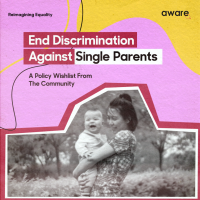
End Discrimination Against Single Parents
Single parents in Singapore were concerned about, among other things, their limited housing options (impacted by their finances and their ability to obtain care and control of their children), and needs assessments that underestimate household expenditure. Divorced parents reported having to apply many times over for maintenance to be enforced, whereas unwed parents worried that their “illegitimate” children were not eligible for intestate inheritance. Policy changes suggested by this group included allowing single parents the same housing and grant options as married applicants; establishing a governmental Child Support Agency to manage maintenance payments; abolishing the concept of “illegitimacy” under inheritance law; and making financial aid criteria more inclusive.
-
Policy Wishlist 2
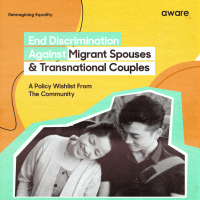
End Discrimination Against Migrant Spouses and Transnational Couples
Migrant spouses in Singapore were concerned about, among other things, the prospect of separation from their Singaporean children; their inability to co-own homes; and their limited work options (as LTVP/+ holders cannot hold more than one job at any given time, or do app-based work, and those on short-term visit passes cannot work at all). Policy changes suggested by this group included simplifying access to Permanent Residence (e.g. upon the birth of Singaporean child or death of Singaporean spouse), which would help facilitate home ownership; and granting the automatic right to work without Letters of Consent.
-
Policy Wishlist 3
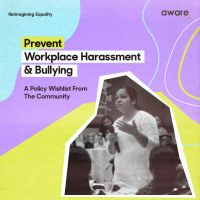
Prevent Workplace Harassment and Bullying
Victims of workplace harassment and bullying in Singapore were concerned about, among other things, a general lack of understanding of workplace bullying and options for recourse; the absence of anti-harassment training programmes for employers, employees and interns; TAFEP’s insufficient powers to assist complainants; and the prospect of retaliation from harassers or employers. Policy changes suggested by this group included introducing national legislation on workplace harassment; mandating relevant training for employers and employees; updating TAFEP and TADM websites to clarify the actions they can take in bullying situations; and establishing an external regulatory body to investigate harassment and audit companies’ HR policies and processes.
-
Policy Wishlist 4
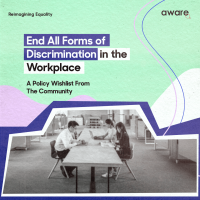
End All Forms of Discrimination in the Workplace
Victims of workplace discrimination in Singapore were concerned about, among other things, the lack of comprehensive legal protections for employees experiencing discrimination; employees’ lack of awareness of internal reporting processes; and TAFEP’s insufficient enforcement powers and confidentiality measures (leading to fears of retaliation from employers). Policy changes suggested included introducing comprehensive anti-discrimination legislation (and protections for returning mothers); mandating relevant training for employers and employees; and establishing an external regulatory body to investigate discrimination and audit companies’ HR policies and processes.
-
Policy Wishlist 5
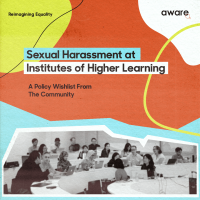
Sexual Harassment at Institutes of Higher Learning
Students at Institutes of Higher Learning (IHLs) in Singapore were concerned about, among other things, the lack of standardised protocol for dealing with campus sexual harassment; policies, processes and staff behaviours that were not victim-centric; and the re-traumatising effect of institutions making police reports without victims’ consent. Policy changes suggested by this group included introducing a National Code of Conduct across all IHLs; implementing a clear protocol of support and resources for victims; mandating relevant training for all students and staff at IHLs; and clarifying “reasonable grounds” for exemption from the legal obligation to report cases.
-
Policy Wishlist 6
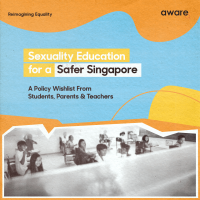
Sexuality Education for a Safer Singapore
Students, parents and teachers of sexuality education in Singapore were concerned about, among other things, the mainstream curriculum’s default sex-negative approach and inadequate focus on consent and gender-based violence; teachers perpetuating problematic ideas such as victim-blaming; LGBTQ students’ feelings of exclusion during sex ed classes; and overall lack of engagement from students. Policy changes suggested by this group included teaching about consent and gender-based violence; adopting a fact-based instead of scare-mongering approach; and fostering respect for different sexual orientations, gender identities, family structures, etc.
-
Policy Wishlist 7
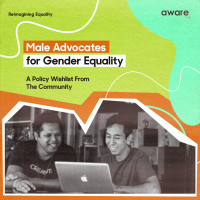
Male Advocates for Gender Equality
Male advocates for gender equality in Singapore were concerned about, among other things, the reproduction of rigid ideas of masculinity during National Service (NS); stereotypes and stigma produced by media portrayals of gender and diverse sexual orientations; and gendered laws such as those pertaining to paternity leave. Policy changes suggested by this group included reviewing how gender, sex and sexuality issues are taught in schools; mandating Diversity & Inclusion training for NS instructors and other educators to better support people with different gender identities and expressions; codifying the prohibition of negative stereotypes related to gender and sexuality in media; and increasing paternity leave.



